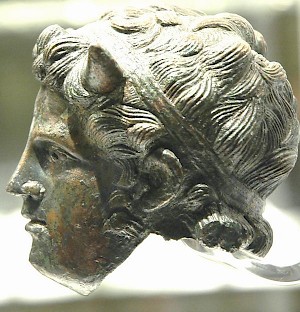The Greek League of 303 BCE
The Greek League of 303 BCE: alliance of Greek towns, organized by Demetrius Poliorcetes, directed against the Macedonian ruler Cassander.

In 338 BCE, king Philip II of Macedonia defeated the army of the Greek towns in the Battle of Chaeronea and proceeded to Corinth, where he founded the "Corinthian League". The Greek towns were to stop fighting each other and share the burdens of a common war against Persia, in which Philip was to be their general. Eventually, Alexander the Great was the commander of the expeditionary forces.
In 303, Demetrius I Poliorcetes, one of the Diadochi, organized a similar alliance: this time, the common enemy of the Greek towns was the Macedonian ruler Cassander, and Demetrius was to be its general. There was a body of councilors (representing the towns, the larger ones having more than one representative) who had to vote on the League's policy; five presidents oversaw the Council's meeting.
Part of the League's charter can be read on an inscription from Epidaurus, which is offered here in translation by M.M. Austin.
The Greek League of 303 BCE
[1] [...] and it shall not be permissible to exercise reprisals against ambassadors coming from the Greeks to the councilors, nor against ambassadors sent by the councilors, nor against men sent out on a military expedition in the common interest nor against men starting off on their respective errands, nor against men traveling back to their own cities, nor to kidnap anyone nor to seize anyone as a security for any reason. If anyone does this, let the magistrates in each city prevent this and let the councilors pass judgment.
[2] The councilors shall meet in peace time during the sacred competitions,note and in war time whenever it seems expedient to the councilorsnote and the general left in charge by the kings for the common defense. The Council shall be in session for as many days as the presidents of the council announce.
[3] Until the common war [against Cassander of Macedonia] is brought to a close, meetings of the council shall take place wherever the presidents and the kingnote or the general appointed by the kingsnote announce; but when peace is established, wherever the crowned competitions are celebrated.
[4] The decisions of the councilors shall have the force of law; they shall transact business when over half of them are present, but not if less than half attend the meeting.
[5] Concerning decisions reached in the Council, the cities shall not be allowed to call to account the councilors they have sent.
[6] There shall be five presidents chosen by lot from among the councilors, when the war has been brought to an end. No more than one president shall be chosen by lot from any single people or city.
[7] The presidents shall summon the councilors and the secretaries of the treasury and the assistants, and lay before the council the matters for deliberation and hand over the resolutions to the secretaries, keeping for themselves legible copies, and they shall introduce all the lawsuits and take care that business is transacted in every way as required, and shall have authority to punish anyone who causes a disturbance.
[8] Anyone who wishes to put forward anything of advantage to the kings and the Greeks, or to denounce men acting against the interests of the allies or refusing to comply with resolutions passed, or to communicate any other business to the councilors, shall register with the presidents, and they shall lay the matter before the councilors.
[9] The presidents chosen by lot shall render accounts for their actions. Anyone who wishes to lay a written charge against them shall do so before the next presidents chosen by lot. When they have received it they shall introduce it before the councilors at the first session which takes place after their period in office.
[10] Until the common war has been brought to a close the representatives of the kings shall always exercise the presidency. If any city does not send the councilors to the meetings according to the agreement, it shall pay a fine of two [lacuna] a day for each of these until the councilors are dismissed, unless a councilor declares on oath that he has been ill.
[11] And if a city does not send whatever military contingent it is instructed to provide, it shall pay a fine every day of half a mina for every cavalryman, 20 drachmas for every hoplite, 10 drachmas for every light armed soldier and 10 for every sailor, until the expiry of the period of military service for all the other Greeks [...]